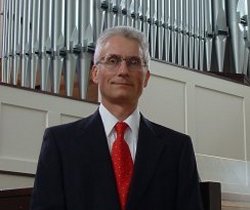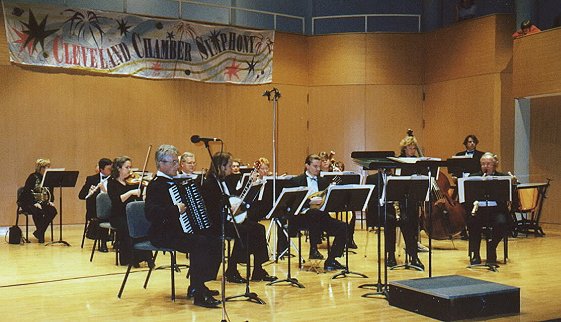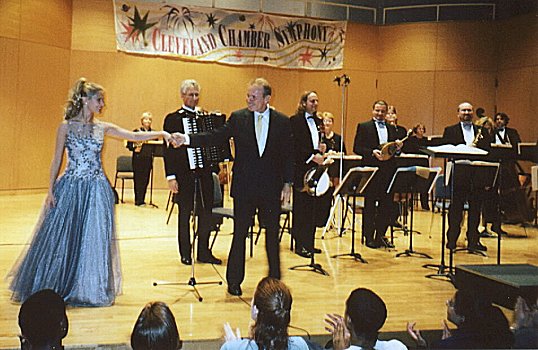
| | Organist | Accordionist | Composer | Conductor | Author | Educator |

 |
Henry Doktorski
|
 |
September 2001: Henry Doktorski performed with the Cleveland Chamber Symphony on Monday September 24, 2001 in a performance of Vintage Alice: Fantascene on a Mad Tea Party by the American Pulitzer Prize-winning composer David Del Tredici (b. 1937). The concert, performed to a packed house at the Drinko Recital Hall at Cleveland State University, featured the Israeli-born soprano Hila Plitmann, and was conducted by the composer.

The musicians warm up before the concert. The 28-minute work, scored for orchestra and a folk group consisting of two saxophones, mandolin, banjo and accordion, is based on text drawn from Lewis Carroll's Alice in Wonderland. Elliot Schwartz and Daniel Godfrey wrote about this piece in Music Since 1945, "Both Carroll's writing and Del Tredici's music draw life from the tension between simple, childlike innocence and the freakish world of dream and imagination. . . . Ebullience and boisterous humor is typical of the entire work, which fluctuates continually between unadorned diatonic harmony and tonal chaos as chord sequences start out simply and then blur, collide, or unravel, either gradually or unexpectedly -- all in keeping with the sometimes charming, sometimes frightening, sometimes outrageous character of Carroll's words and pictures."
Del Tredici explained in an interview with the conductor Richard Dufallo, why he was attracted to Lewis Carroll. "With nonsense," he said, "I felt somehow I could do whatever I wanted with the words. When I began to set the Alice in Wonderland texts, I took the craziest ones first, like 'Jabberwocky,' because they were, in a sense, the most adaptable to my atonal language. . . . There is no expectation or tradition for setting nonsense verse. It was very liberating. As I went on with the Alice pieces, An Alice Symphony, Adventures Underground, I think the most seriously tonal might have been Vintage Alice. . . . I certainly wasn't tonal in the Bach-Beethoven-Brahms sense. But I was beginning to get a feel for tonal materials."
The composer spoke about the accordion in his oeuvre: "When I began writing my musical setting of Alice In Wonderland for orchestra, I wanted to include a second group of instruments which would sound completely different from a symphony orchestra; something totally UN-orchestral. After some consideration, I decided that the saxophone, mandolin, banjo and accordion would be perfect because those instruments -- due to their cultural identity and distinctive tonal qualities -- were rarely used with symphony orchestras."
Del Tredici continued, "Believe it or not, I actually love the accordion; to me at least, it always sounds funky in an orchestral setting. It's sound is quite unique. In my Alice pieces, I write for the accordion as a solo instrument and never try to blend it with the other instruments. Early in my composing career I wrote mostly atonal works. But when I discovered the accordion I developed a desire to use its left-hand chord buttons -- the major, minor, seventh and diminished buttons -- in my Alice In Wonderland piece. This was a turning point for me: it caused me to consider using tonality in my compositions. I suppose for this then, I am indebted to the accordion for opening my eyes to the possibilities of tonality."
Doktorski said, "The accordion part was substantial: some two dozen pages of music. It was one of the most difficult accordion pieces I have played with orchestra -- due to the presto tempo and convoluted right and left-hand passages (after all, it was a mad tea party), but that simply made the live performance even more exciting.

Soprano Hila Plitmann and composer/conductor David Del Tredici. "For much of the piece, the accordion, banjo and mandolin functioned as a trio within the orchestra; at several other places, the accordion was featured as a solo instrument and even had its own cadenza toward the end. My favorite part was the accordion and soprano duet near the conclusion of the piece, a classical-period stylistic variation on the Twinkle Twinkle Little Star melody (which figures prominently throughout the piece) which was pure pleasure to play."
During a four-hour recording session held the day after the concert, Vintage Alice was recorded for a future compact disc release.
The quotation by David Del Tredici about the accordion was from a telephone conversation with Henry Doktorski dated August 3, 2001.
|